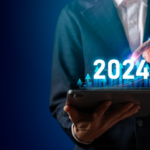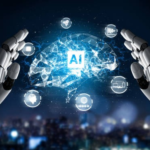
Balancing Marketing Innovation and PDPA Compliance: Staying Ahead in 2024
November 20, 2024
Future-Proof Your Marketing: Embrace AI Innovation Now
November 21, 2024In the rapidly advancing world of digital marketing, artificial intelligence (AI) is no longer a luxury but a necessity. As AI technologies continue to evolve, they are becoming integral to creating personalized customer experiences, optimizing campaigns, and enhancing business efficiency. However, for AI to move from a theoretical concept to a practical tool in marketing, businesses must take a strategic approach to harness its potential. It’s not enough to simply adopt AI tools; companies need to implement them effectively to drive measurable results.
This blog post will explore how businesses can take AI from algorithms to action. We’ll discuss how to make AI-driven marketing strategies actionable, offering practical steps, real-world examples, and a comprehensive view of how to apply AI in your marketing efforts to achieve success.
The Rise of AI in Marketing
AI has been making waves in marketing for several years now, but 2024 is shaping up to be a pivotal year. With advances in machine learning, natural language processing (NLP), predictive analytics, and automation, AI is now able to deliver smarter, faster, and more personalized marketing solutions. Marketers are increasingly looking to AI to make sense of vast amounts of data, automate repetitive tasks, and predict consumer behavior with greater accuracy than ever before.
The need for AI in marketing stems from the enormous volume of data generated by businesses today. Traditional methods of analyzing this data are no longer effective; AI allows marketers to process and analyze this information in real time, generating insights that would have been impossible to derive manually. Furthermore, customer expectations have shifted significantly. Consumers now expect hyper-personalized, relevant, and timely content across multiple platforms. AI offers the tools to meet these demands efficiently, enabling businesses to stay ahead of the competition.
As a result, AI has moved beyond a buzzword to an essential element of any modern marketing strategy.
Turning AI into Action
Although AI has immense potential, turning its capabilities into tangible marketing results requires thoughtful strategy and careful implementation. Marketers need to transform raw algorithms into actionable tactics that create measurable impact. Here are several ways you can implement AI in your marketing strategy:
1. Hyper-Personalization: Crafting Tailored Experiences
One of AI’s most powerful applications in marketing is its ability to enable hyper-personalization. Traditional methods of personalization, such as segmenting customers by demographics, are limited in their scope and effectiveness. AI, on the other hand, can analyze vast amounts of customer data, such as browsing behavior, past purchases, location, and social media activity, to create highly personalized marketing campaigns.
AI-driven marketing platforms can automatically segment customers into micro-segments based on their individual behaviors and preferences, allowing marketers to deliver more relevant messages, recommendations, and promotions.
To implement hyper-personalization:
- Leverage AI-powered customer relationship management (CRM) systems to continuously track and update customer preferences and behaviors.
- Use AI tools to recommend personalized content or products based on past interactions.
- Develop dynamic content that adapts to users in real-time.
For example, a fashion retailer might use AI to recommend products based on previous purchases or browsing behavior, providing customers with a seamless and personalized shopping experience that increases conversion rates.

2. Predictive Analytics: Staying Ahead of Customer Behavior
AI-powered predictive analytics allow marketers to anticipate customer behavior, forecast future trends, and plan campaigns accordingly. By analyzing historical data, AI can predict which customers are most likely to convert, when they are likely to make a purchase, or which customers are at risk of churning. This enables marketers to take proactive steps to engage customers before they drop off or to capitalize on the right moments to upsell or cross-sell.
For example, AI can be used to predict when a customer is likely to make a repeat purchase and automatically trigger a reminder or special offer at the right time.
To leverage predictive analytics:
- Implement AI tools to analyze past customer interactions and predict future actions.
- Use these insights to drive targeted email campaigns, social media ads, and product recommendations.
- Regularly update your predictive models to ensure they are based on the most current data.
Predictive analytics can significantly improve customer retention rates, optimize marketing budgets, and increase overall ROI.
3. AI-Powered Chatbots: Enhancing Customer Interaction
AI-driven chatbots are rapidly becoming a staple in customer service and marketing. They allow businesses to offer 24/7 support, provide personalized product recommendations, answer customer queries in real-time, and even assist with completing transactions. The benefit of using chatbots goes beyond convenience; they improve engagement by delivering immediate, personalized responses.
Chatbots powered by natural language processing (NLP) can understand and interpret human language, making interactions more fluid and less robotic. By analyzing past interactions, chatbots can also offer personalized suggestions, making them an invaluable tool for both customer service and marketing.
To implement AI chatbots effectively:
- Use AI chatbots across your website, social media platforms, and messaging apps.
- Program the chatbot to handle frequently asked questions, process orders, and recommend products.
- Integrate your chatbot with CRM systems to personalize customer interactions based on their purchase history and preferences.
For example, an e-commerce website can use an AI chatbot to help customers find products based on specific requirements (e.g., size, style, or color), offer personalized discounts, and guide them through the checkout process.
4. Content Creation: AI as a Creative Partner
Creating high-quality content consistently is one of the most time-consuming aspects of digital marketing. AI is increasingly being used to automate content generation, from drafting blog posts and product descriptions to creating social media copy. While AI is not yet a replacement for human creativity, it can be an invaluable tool for augmenting content creation processes, improving efficiency, and maintaining a consistent output.
AI-powered tools can analyze top-performing content across platforms and suggest topics, headlines, or keywords that resonate with target audiences. This allows marketers to create content that is both relevant and optimized for SEO.
To use AI in content creation:
- Use AI tools like GPT-3 or Jasper to generate content ideas, headlines, and copy drafts.
- Implement AI-driven SEO tools to optimize content for search engines.
- Use AI to monitor content performance and adjust strategy based on data-driven insights.
For example, a content marketing team might use AI to generate blog post drafts or social media updates based on trending topics or industry news, saving time while maintaining relevance.

5. AI-Driven Advertising: Maximizing Ad Spend Efficiency
AI is revolutionizing digital advertising by automating and optimizing campaigns in real-time. From Google Ads to Facebook and Instagram campaigns, AI tools can adjust bidding strategies, improve targeting, and optimize ad creative to maximize ROI. By analyzing user behavior, AI can identify the most relevant audience for a campaign, ensuring that marketing budgets are spent efficiently.
To leverage AI for advertising:
- Use AI tools to optimize bidding strategies for better ad performance at a lower cost.
- Implement machine learning algorithms to optimize ad targeting based on user data.
- Use AI to test and refine ad creatives, ensuring they resonate with your audience.
For example, a travel agency might use AI to run ads that target individuals based on their search history, location, and travel preferences, delivering highly personalized and timely offers.
Overcoming Challenges with AI in Marketing
While AI offers immense potential, implementing it effectively in marketing comes with challenges. Data privacy and security, for example, are significant concerns that marketers must address, especially with the increasing stringency of regulations like GDPR and CCPA. Additionally, there is a need for skilled talent to operate and fine-tune AI systems, as well as ongoing investment in data infrastructure.
Marketers must focus on:
- Ensuring data security and compliance with privacy regulations.
- Continuously training staff to work with AI tools effectively.
- Managing data quality to avoid biased or inaccurate insights.
Conclusion: Embracing AI for Sustainable Marketing Growth
As AI continues to evolve, its ability to empower marketers to drive personalized, efficient, and data-driven campaigns will only grow. However, for businesses to truly benefit from AI, they must take a strategic approach, ensuring that they not only adopt AI tools but also implement them in ways that create measurable value.
By moving beyond algorithms and converting AI insights into actionable marketing strategies, companies can achieve greater customer engagement, improved ROI, and long-term success. The key is to embrace AI as a partner in your marketing journey—one that, when used responsibly, can help you stay ahead in an increasingly competitive digital landscape.


